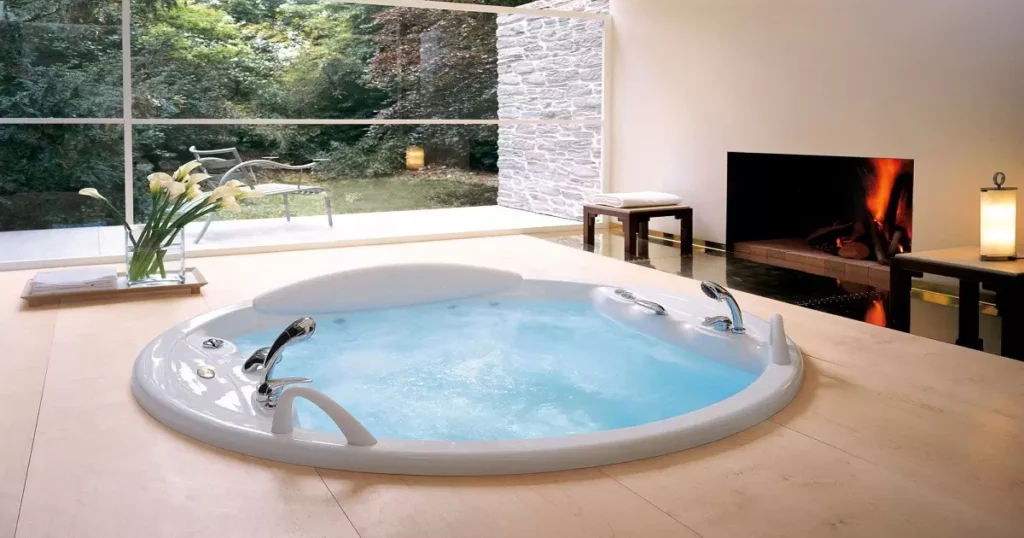Wondering, How long does a Jacuzzi take to warm up Well, the time it takes for a Jacuzzi to warm up refers to the duration required for the water in the Jacuzzi to reach the desired temperature. Many factors influence this process, including the size of the Jacuzzi, the initial water temperature, and the heating system it utilizes
If youve ever eagerly anticipated a relaxing soak in a Jacuzzi, you might have wondered about the wait time. How long does a Jacuzzi take to warm up? is a common question among spa enthusiasts. The anticipation can be quite exciting, but understanding the variables affecting the warming time can help manage your expectations and plan your Jacuzzi experience more effectively.
The time it takes for a Jacuzzi to warm up can vary significantly from one model to another. On average, it may take anywhere from 15 minutes to a few hours to reach the desired temperature, typically set between 100°F to 104°F (37°C to 40°C). Factors such as the Jacuzzis size, heating capacity, and initial water temperature play a crucial role in determining the duration.
Understanding the Heating Process
To truly understand the heating process of a Jacuzzi, one must first recognize the key components involved. The heating element, usually an electric resistance heater, is responsible for raising the temperature of the water. It is located within the Jacuzzi and requires electricity to function. The thermostat, another crucial element, allows users to set and maintain their desired water temperature. It continually monitors the water temperature and signals the heater to turn on or off as needed to maintain the set temperature. Together, these components work harmoniously, ensuring that the water is heated efficiently and consistently.
When the Jacuzzi heating process is initiated, the initial water temperature plays a significant role in determining the warm-up time. If the starting water temperature is closer to the desired temperature, the heater will require less time to raise it to the desired level. However, if the initial water temperature is significantly lower, the heater will have to work harder and longer to reach the desired temperature. This is why it is recommended to keep the Jacuzzi filled with water at or near the desired temperature, as it reduces the time needed for the heating process. Additionally, it is worth noting that the time of year and ambient temperature can also impact the warm-up time, as colder weather may require extra heating to compensate for heat loss.
Factors Affecting Jacuzzi Warm-Up Time
Factors such as the size and capacity of the Jacuzzi play a crucial role in determining the warm-up time. A larger Jacuzzi with a higher capacity will naturally take longer to heat up as it requires more energy to raise the water temperature. Conversely, a smaller Jacuzzi with a lower capacity will heat up relatively faster. This highlights the importance of selecting a Jacuzzi that aligns with your desired warm-up time, as well as taking into account the number of people who will be using it and the frequency of use.
Another significant factor affecting Jacuzzi warm-up time is the water temperature. If the Jacuzzi is filled with cold water, it will naturally take more time and energy to heat it up to the desired temperature. On the other hand, if the Jacuzzi is filled with warmer water initially, it will require less time to reach the desired temperature. The starting temperature of the water can have a considerable impact on the overall warm-up time, so it is essential to consider this factor when planning for a relaxing soak in your Jacuzzi.
The Role of Jacuzzi Size and Capacity

Jacuzzi size and capacity play a crucial role in determining the warm-up time of the water. In general, larger Jacuzzis with greater water capacity tend to take longer to heat up compared to smaller ones. This is because there is more water volume that needs to be heated, and larger volumes of water generally take more time to reach the desired temperature. Therefore, individuals who own larger Jacuzzis should allow sufficient time for the water to heat up before they plan to use it.
Moreover, the size and capacity of a Jacuzzi also impact the overall energy consumption during the heating process. Larger Jacuzzis generally require more energy to heat the water to the desired temperature. Therefore, it is important for individuals with larger Jacuzzis to be mindful of the energy consumption and consider energy-efficient heating systems. By opting for energy-efficient heating systems, they can minimize the environmental impact and reduce their utility bills while still enjoying the benefits of a warm and soothing Jacuzzi experience.
The Impact of Water Temperature on Warm-Up Time
Water temperature plays a crucial role in determining the time required for a Jacuzzi to warm up. The starting temperature of the water significantly affects the duration it takes for the Jacuzzi to reach the desired warmth. When the initial water temperature is higher, the warm-up time reduces as the heating system does not have to work as hard to raise the temperature. Conversely, if the water is at a lower temperature, the warm-up process will take longer as the heating system must work harder to heat the water to the desired temperature.
Furthermore, the desired water temperature also affects the warm-up time. If you want your Jacuzzi to reach a higher temperature, the warm-up time will naturally be longer compared to a lower temperature setting. This is because the heating system needs to raise the temperature higher, which requires more energy and time. Therefore, it is essential to consider the ideal water temperature based on personal preferences and the time available for the warm-up process.
The Significance of Ambient Temperature
Ambient temperature plays a crucial role in the warm-up time of a Jacuzzi. The term ambient temperature refers to the temperature of the surrounding environment. When the ambient temperature is low, it becomes more challenging for the Jacuzzi to heat up efficiently. This is because the colder air outside cools down the water more quickly, making it take longer to reach the desired temperature. Conversely, if the ambient temperature is high, the Jacuzzi can heat up faster since the surrounding air helps to retain warmth. Therefore, understanding and considering the significance of ambient temperature is essential in managing the warm-up process effectively.
In addition to the time it takes to heat up, ambient temperature also has an impact on energy consumption. When the ambient temperature is low, the heating system of the Jacuzzi needs to work harder and use more energy to maintain the desired warmth. This not only affects the energy efficiency of the Jacuzzi but also increases operating costs. On the other hand, when the ambient temperature is high, the heating system requires less energy to reach and maintain the desired temperature. By monitoring the ambient temperature and adjusting the heating settings accordingly, one can optimize the energy efficiency of the Jacuzzi and minimize the associated expenses.
Heating Systems and Their Efficiency
There are various types of heating systems available for Jacuzzis, each with its own level of efficiency. One commonly used heating system is the electric heater. This system works by passing an electric current through a heating element, which then heats up the water in the Jacuzzi. Electric heaters are known for their quick and efficient heating capabilities, allowing you to enjoy a warm and soothing soak in no time. Another heating system that is commonly used is the gas heater. Gas heaters use natural gas or propane to produce heat, which is then transferred to the water in the Jacuzzi. These heaters are known for their fast heating times and energy efficiency, making them a popular choice among Jacuzzi owners.
In addition to electric and gas heaters, there are also heat pump systems available for Jacuzzis. Heat pumps work by extracting heat from the air or water and transferring it to the Jacuzzi, providing an energy-efficient way to heat the water. These systems are particularly beneficial in regions with moderate climates, as they can extract heat from air as cool as 50 degrees Fahrenheit. However, it’s important to note that heat pump systems may take longer to heat the water compared to electric or gas heaters. Overall, the choice of heating system for your Jacuzzi depends on your specific needs and preferences, as well as the climate and prevailing conditions in your area.
Tips to Speed up Jacuzzi Warm-Up Time
To speed up the warm-up time of your Jacuzzi, there are several tips and strategies you can implement. Firstly, it is essential to ensure that your Jacuzzi cover is properly secured when not in use. A well-fitted cover helps to trap the heat inside the Jacuzzi, preventing it from escaping and significantly reducing the warm-up time. Additionally, you can consider investing in a thermal blanket specifically designed for Jacuzzis. These blankets are designed to float on the surface of the water, acting as an insulating barrier that helps to retain heat and accelerate the warm-up process.
Another effective tip to speed up the warm-up time is to install a timer on your Jacuzzi heating system. With a timer, you can set a specific time for the heater to turn on, ensuring that the water reaches the desired temperature right when you need it. This way, you can avoid waiting for the Jacuzzi to warm up manually and save both time and energy. Moreover, it is crucial to regularly clean and maintain your Jacuzzi. A clean and well-maintained Jacuzzi operates more efficiently, allowing it to heat up faster.
Maintaining Optimal Water Temperature
Maintaining optimal water temperature in your Jacuzzi is essential for a relaxing and enjoyable experience. To achieve this, it is important to regularly monitor and adjust the water temperature as needed. By doing so, you can ensure that the water is neither too hot nor too cold, providing you with the perfect soothing environment.
It is recommended to use a high-quality thermometer to measure the water temperature accurately. This will enable you to make precise adjustments based on your preference and the desired therapeutic effects. Additionally, it is advisable to consult the manufacturer’s guidelines and recommendations for the ideal water temperature range for your specific Jacuzzi model. By following these guidelines and regularly checking the water temperature, you can maintain optimal conditions for a blissful hydrotherapy session.
| Time | Temperature | Factors to Consider |
| Varies | 100°F – 104°F | Jacuzzi size, initial water temperature, heating system |
Benefits of Preheating Your Jacuzzi
Preheating your Jacuzzi can bring about several benefits that enhance your overall hot tub experience. Firstly, preheating ensures that the water is at the desired temperature when you are ready to use it. This eliminates the waiting time for the water to warm up and allows for immediate relaxation and enjoyment. Secondly, preheating helps to optimize the performance of your Jacuzzi’s heating system. By allowing the water temperature to stabilize before use, the heating system can maintain a steady and consistent heat, resulting in a more comfortable and enjoyable soak.
Another benefit of preheating is the ability to customize the water temperature according to your preferences. By warming up the water in advance, you can ensure that it reaches the desired temperature for your specific needs. Whether you prefer a soothing warm soak or a hotter therapeutic experience, preheating allows you to achieve the ideal water temperature that caters to your comfort level. Additionally, preheating helps to conserve energy and reduce operating costs. By avoiding the need to continually heat the water from a lower starting temperature, preheating minimizes the time and energy required to reach the desired warmth, ultimately saving you money in the long run.
Overall, preheating your Jacuzzi offers a range of benefits that contribute to a more enjoyable and efficient hot tub experience. From eliminating waiting time to optimizing heating system performance and providing customized water temperature, preheating enhances your ability to relax and unwind. Additionally, it promotes energy conservation and cost-effectiveness, making it a practical choice for those seeking both comfort and efficiency. By prioritizing preheating, you can ensure that your Jacuzzi is always ready for use, providing endless hours of blissful relaxation.
Safety Precautions during the Warm-Up Process
When it comes to enjoying the warm, soothing water of your Jacuzzi, it is crucial to ensure your safety during the warm-up process. Firstly, it is important to always follow the manufacturer’s instructions and guidelines for operating your Jacuzzi. These guidelines provide valuable information on the proper use and maintenance of your Jacuzzi, including specific safety precautions that should be taken during the warm-up process. Following these instructions will not only help prevent any potential accidents or injuries but also ensure the longevity of your Jacuzzi.
Additionally, it is essential to regularly inspect your Jacuzzi for any signs of wear and tear or damage before starting the warm-up process. Check the power supply, electrical connections, and heating system to ensure they are all in proper working condition. Avoid using the Jacuzzi if you notice any frayed wires, malfunctioning controls, or water leaks, as these can be potential hazards. Regular maintenance and inspection of your Jacuzzi will help identify any potential issues early on and ensure a safe and enjoyable warm-up process.
FAQs
What is the heating process in a Jacuzzi?
The heating process in a Jacuzzi refers to the method by which the water in the Jacuzzi is heated to the desired temperature for use.
What factors can affect the warm-up time of a Jacuzzi?
Several factors can affect the warm-up time of a Jacuzzi, including the Jacuzzi’s size and capacity, water temperature, ambient temperature, and the efficiency of the heating system.
How does the size and capacity of a Jacuzzi affect its warm-up time?
The size and capacity of a Jacuzzi can affect its warm-up time because larger Jacuzzis require more water to be heated, which can take longer than heating a smaller Jacuzzi with less water.
Does the water temperature have an impact on the warm-up time of a Jacuzzi?
Yes, the starting temperature of the water in the Jacuzzi can impact the warm-up time. If the water is already warm, it will take less time to reach the desired temperature compared to starting with colder water.
How does the ambient temperature affect the warm-up time of a Jacuzzi?
The ambient temperature, or the temperature of the surrounding environment, can affect the warm-up time of a Jacuzzi. If the ambient temperature is colder, the Jacuzzi may take longer to heat up.
Conclusion
So there you have it, the answer to How long does a Jacuzzi take to warm up? relies on various factors such as the Jacuzzi’s size, initial water temperature, and heating system. Understanding these variables can help you plan your relaxation time more effectively and ensure an enjoyable Jacuzzi experience.
Next time you’re looking forward to a calming dip in the warm waters of a Jacuzzi, keep in mind the factors influencing the heating process. By considering the size of the Jacuzzi and its heating capacity, you can estimate the approximate time it will take for the water to reach your desired temperature, allowing you to prepare for a soothing and rejuvenating experience.








